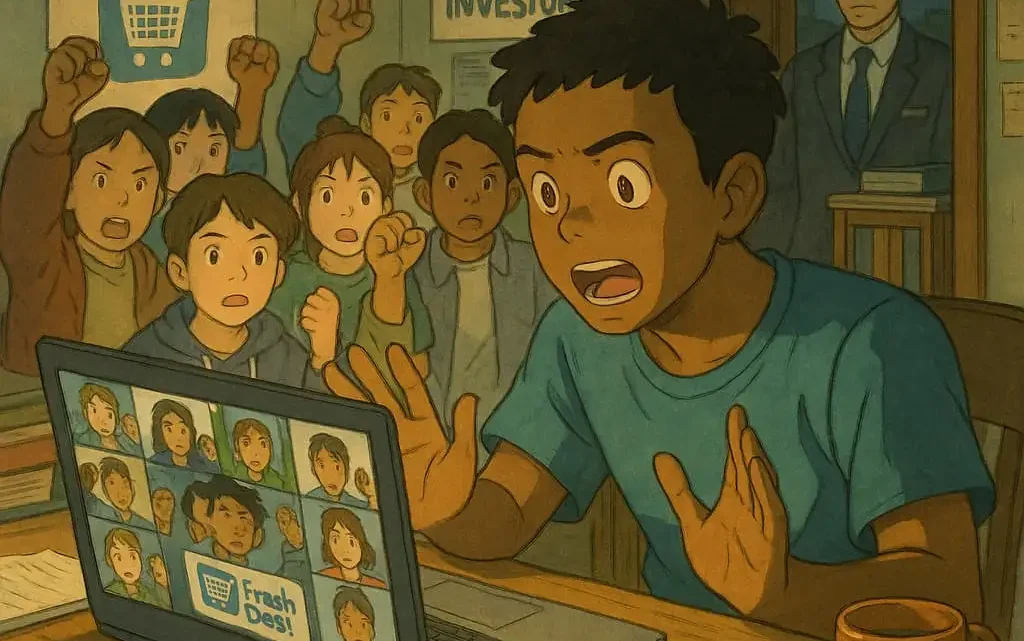
What I Learned After an Investor Tried to Steal My Business
Two Fridays ago, I was holed up in a co-working space on Admiralty Way, staring at my laptop like it owed me money.
My e-commerce startup was struggling. Sales had flatlined, my ad budget was basically pocket change, and every “genius” funnel I’d watched on YouTube just wasn’t working. I needed something different—something loud, messy, cheap, and viral.
Trending Now!!:
That’s when I stumbled on a random thread on Twitter: “Guerrilla Business, Marketing & Entrepreneurship Tactics Nobody Talks About.”
I read it half out of boredom until one reply stopped me cold. “If you’re broke, turn your customers into your marketing team.” That was it. That was the whole tweet. I sat up straight and muttered, “Challenge accepted.”
I created a simple promo: first 100 customers who stuck our brand logo on their cars, bikes, or laptop bags would get a lifetime 50% discount plus a cut from every sale they referred. I called it the #StickerHustle.
I dropped the challenge on Instagram, TikTok, and Twitter with zero expectations. By midnight, the hashtag had garnered over 4 million views, and a few TikTokers had already created memes about it. One business blog quoted me as “a Gen Z founder doing Gen Z things.”
Orders poured in. My site crashed twice. I was using free-tier AWS, so it felt like I was holding my startup together with masking tape and prayers.
By Monday morning, I got a DM from someone named “Bayo | Investor | Tech Angel.” He said he loved the campaign and wanted to invest.
We met at a posh café in Ikoyi. The man had Gucci loafers, a MacBook that looked fresh out of the box, and a vocabulary full of buzzwords like “growth loops,” “unit economics,” and “strategic partnerships.” I played along. We talked. He promised ₦50 million for 10% equity after due diligence. I said yes before my brain could catch up.
Two days later, I got a panicked call from one of the sticker ambassadors. “Guy, your discount code no dey work. And your website dey redirect somewhere else.” I froze. I jumped online. My entire site was gone—redirected to a clone.
Same layout. Same products. Even the logo. Only difference? All sales now went to “Bayo Ventures Ltd.” My mouth dried up instantly.
He had cloned my entire brand. During “due diligence,” he had apparently scraped my site backend, copied my content, and launched a parallel platform while I was out here waiting for investor paperwork. And he didn’t even tell me. I was being erased from my own business.
But I wasn’t going out like that.
Luckily, I had saved all the phone numbers of the 2,000 people who joined the sticker campaign. I fired off a late-night SMS blast: “Emergency town hall on Zoom in one hour. We fight back tonight.” About 800 people showed up. I explained everything.
No script. Just vibes and heartbreak. I told them the truth: the guy we thought was funding us was actually stealing from us. Then I offered them something nobody had before—equity. Real pieces of the business. Tiny, yes, but real. In return, I needed their help to take back the internet.
What followed still gives me chills. TikTok blew up with videos defending me. Creators did side-by-side breakdowns of the fake site and ours. People tweeted with the hashtag #TakeBackOurBrand.
One influencer said, “This is the first time I’ve seen an entrepreneur weaponize community like this in Nigeria.” Traffic to our new domain shot through the roof. A podcast in Yaba called it “the scrappiest startup comeback of the year.”
Uncle Bayo? Oh, Twitter finished him. I haven’t heard from him since, but I got a message from another investor who said, “We saw the whole drama. If you still need funding, let’s talk. We invest in fighters.” This time, I read every line of the term sheet twice.
Looking back now, I can laugh. But it cost me: two weeks of sleepless nights, near-anxiety attacks, and a permanent distrust of men in designer loafers.
But I learned that sometimes in business, marketing and entrepreneurship, your real power isn’t your product—it’s your people. My early adopters didn’t just save my startup. They became part of it.
So, yeah, I didn’t just build a brand—I built a rebellion.
And if you’re ever stuck, broke, and desperate, just remember: all it takes is one crazy idea, a few loyal people, and a hashtag loud enough to drown out the noise.
